Achievements
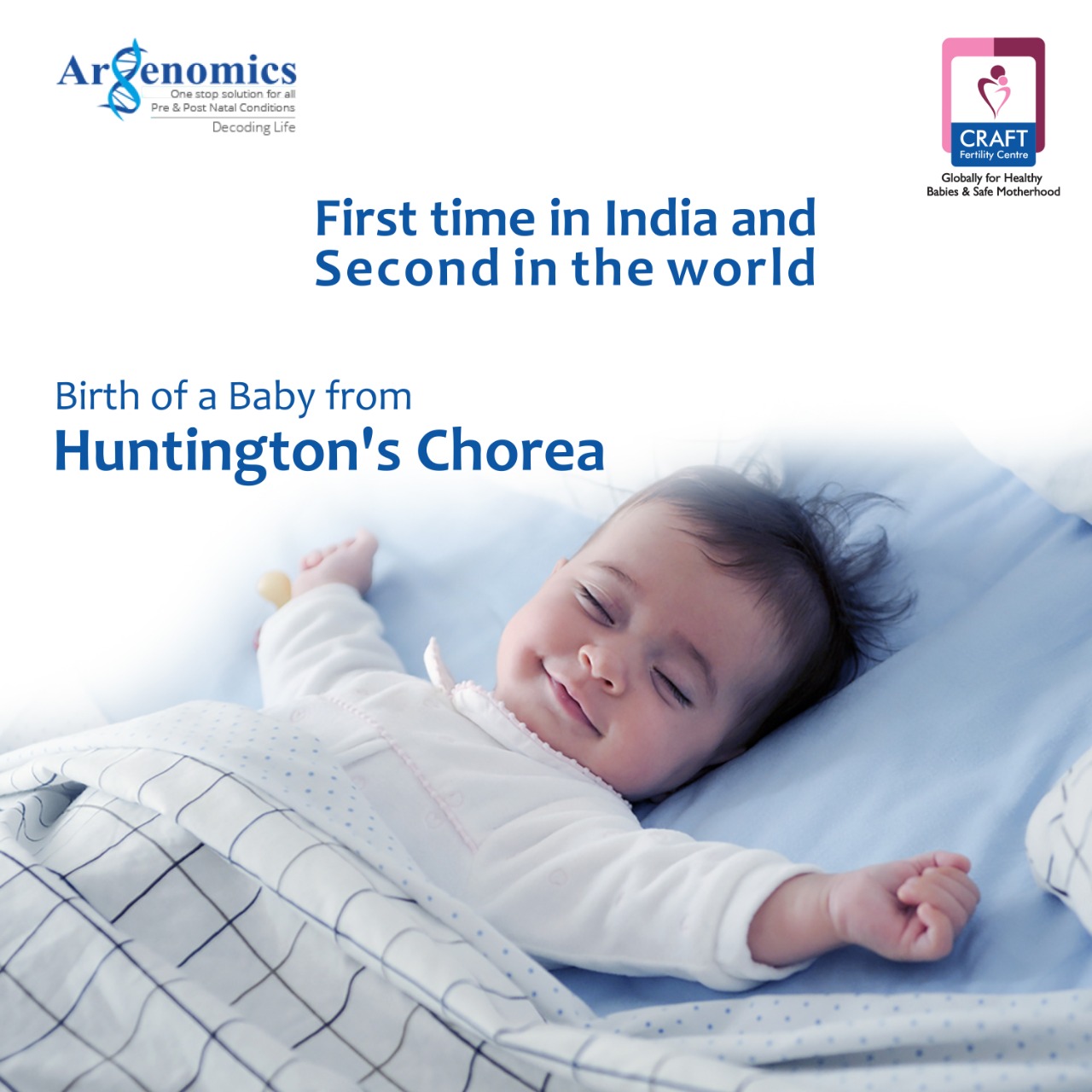
Birth of a Healthy Baby Free from Huntington's Chorea
A milestone success first time in India and Second in world using the latest haplotyping technology.
Huntington's chorea is a rare inherited nurodegenerative disease affecting the bases of DNA in the HTT gene of humans. It is inherited as an autosomal dominant form which has a 50% chance of being passed on to children if one parent carries a copy of the defective HD gene.HTT disease affects adults and it's prevalence in India between three to seven affected among 1 lakh people. The effect of the disease is such that the affected person usually dies within 15-20 years. Lack of awareness and no testing strategies increases the social burden. Prenatal diagnosis of HT disease becomes challenging when fetus is found to be affected and parents are left with only option of either termination or deliver a child with the struggling disease. At Argenomics, a renowned PGT Lab in Kerala and pioneers in dealing with monogene defects with greater success, we have developed first time in India haplotyping technology with our expertise to detect the HTT gene defect in embryo stage itself. After the in vitro fertilisation technique embryos obtained under toes PGTM (preimplantation genetic testing) to check the detective gene status. The present case was referred to us where mother had the HTT gene defect inherited from her father. The physical condition was not so favouring for her hence family decided that her own mother would be her surrogate. So embryos obtained from the patient herself (10 tested) were tested for the defective gene (3 embryos were found normal) and one single normal embryo in the first attempt gave rise to a healthy baby birth at our hospital. This case was challenging as developing a PCT m assay for rare disease was challenging. In conclusion treatment of such genetic diseases becomes challenging and this increases social burden. Hence employing high end technologies and expertise can help prevent genetic conditions to reoccur in family and make a healthy gene pool future generations and country.
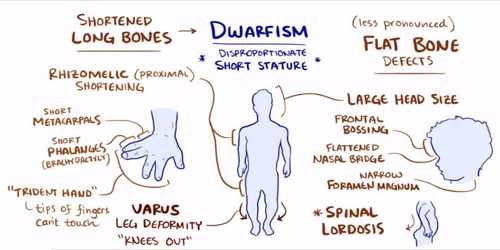
Case of a rare genetic disorder Dwarfism or achondroplasia
Case of a rare genetic disorder Dwarfism or achondroplasia. This couple married for 8 years had no pregnancy. The male partner was diagnosed with dwarfism by clinical features and no genetic testing done on him.The male partner underwent skeletal extension also. Apart from this issue they had some problems in conception. Many a times doctors don’t feel the need of doing genetic testing as they think there is no treatment for such conditions. But it is not always true as couples with genetic conditions can still have healthy babies through preimplantation genetic testing coupled with IVF treatment as this can test the genetic conditions in the embryo stage prior to pregnancy itself and healthy embryo can be put into the mother’s uterus. As a first line of genetic investigation the male partner underwent counseling with dr Ritu and she could screen the FGFR3 ( fibroblast growth factor gene ) gene for any responsible mutations which led to this condition and the result came positive. Hence the male had the faulty gene. In majority of the genetic cases the faulty gene is passed from parents. In Dwarfism condition any one parent if has a faulty gene can pass on to the kids. As it is a dominant genetic condition and has 50 percent recurrence risk. Interestingly in this case the male partner parents was normal and didn’t have the dwarfism.S So this condition is medically termed as germline genetic condition where either the egg or sperm of the parents would have undergone genetic changes in the FGFR3 gene responsible for dwarfism. This is certainly a rare form .Male had faulty gene so he has high chance of passing it on to his children. The couple was adviced for ivf and PGD to avoid dwarf babies. The skilled geneticists from Argenomics team had a customised protocol for this disease as not all genetic conditions are treated same . Specific markers specially designed to test this gene in embryo level is required and that was made by our team of specialists in medical genetic unit. After ivf 5 embryos were tested for this condition and four embryos were found to be normal without faulty gene and one was affected which contained the faulty gene. We transferred the two embryos as per couple’s wish and today delivered healthy twins without any genetic problems. This is a rarest achievement first time in India and second in the world as per published literature.
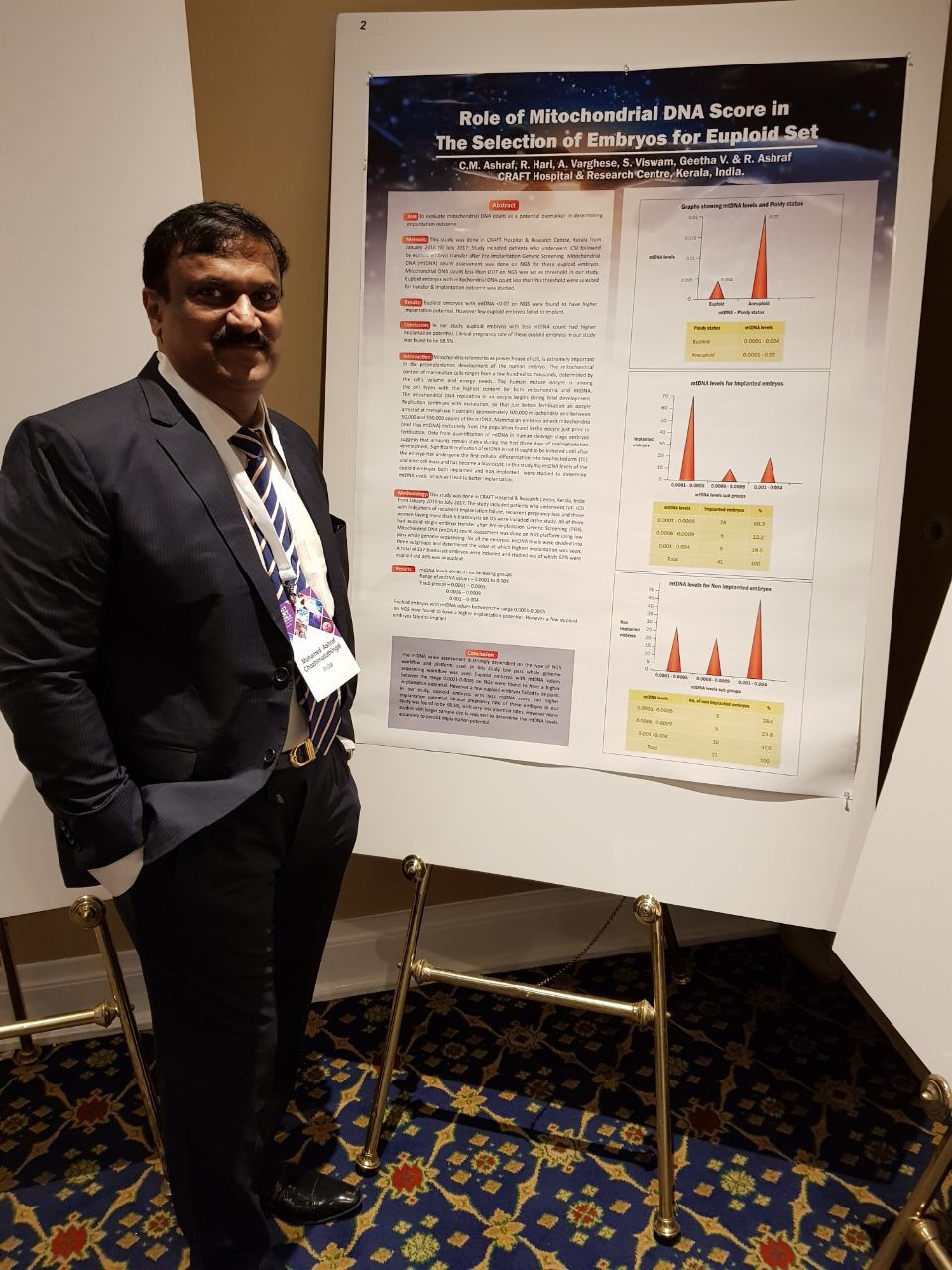
ROLE OF MITOCHONDRIAL DNA SCORE IN THE SELECTION OF EMBRYOS FOR EUPLOID SET
Glad to announce the successful acceptance of our poster at ART world congress on" role of mitochondrial DNA score in the selection of embryos for euploid set " got accepted for publication in JARG journal . Also only two out of 14 such studies were selected and ours was one among them which also got selected for the oral presentation. Though a very new research Mitochondrial count is essential for a successful embryo implantation. Our work shows the insights on how the mitochondrial score plays an important role in the preimplantation genetic screening and transfer of embryos.This study was made successful by High team efforts of Argenomics led by Chief medical Geneticist Dr Ritu Hari
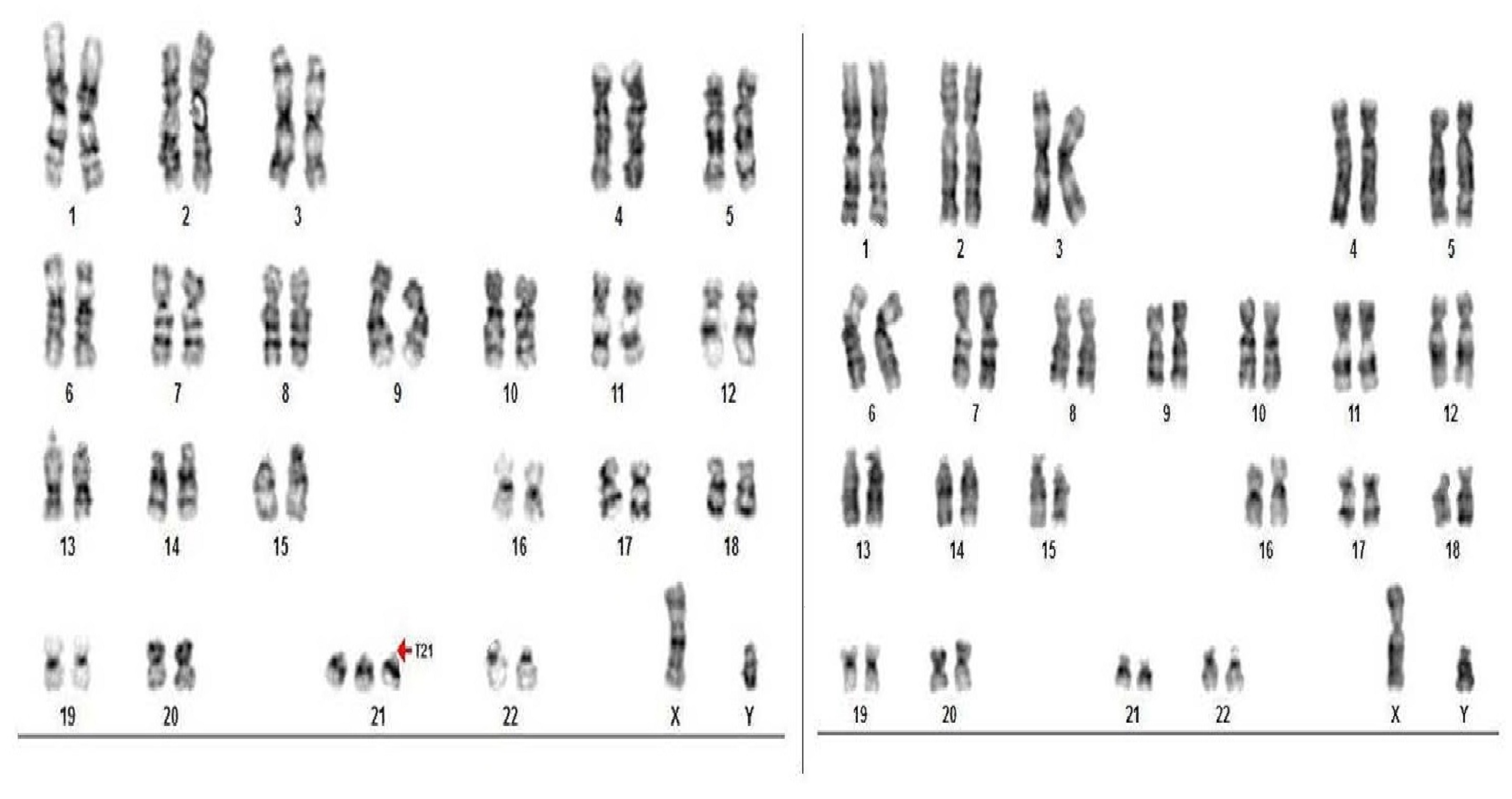
Pregnancy with " a single normal embryo " achieved for an Azoospermic and Mosaic Down Syndrome male partner with the combination of MICRO TESE with ICSI-PGS
Pregnancy with a single normal embryo achieved in a female whose male partner was Azoospermic and mosaic Down syndrome after Micro tese Combined with ICSI PGS - Microtese is a surgical aspiration of sperms performed in azoospermic men. This male partner with karyotype 47XY+21/46XY referred to as mosaic Down syndrome after microtese could retrieve sperms and performed ICSI with PGS . Single normal embryo resulted in clinical pregnancy. This is certainly a milestone where sophisticated technologies and techniques are combined to treat infertile couple.

Successful first time pregnancy for a couple with seven times failed IVF after PGD- A rare Case
Successful PGD case for a couple with seven times failed ivf gets pregnant first time. Details. Couple with repeated implantation failures elsewhere after ivf due to a chromosomal defect ie balanced translocation in the male partner was offered a preimplantation genetic diagnosis for all embryos. This couple had seven ivf failures and never achieved pregnancy. This theory explains that sometimes in majority cases due to chromosomal defect in parents the embryo may get rejected resulting in no pregnancy or misscarraiges. After performing ICSI at craft and then PGD was done at argenomics the couple got a normal embryo and this resulted in a clinical pregnancy.
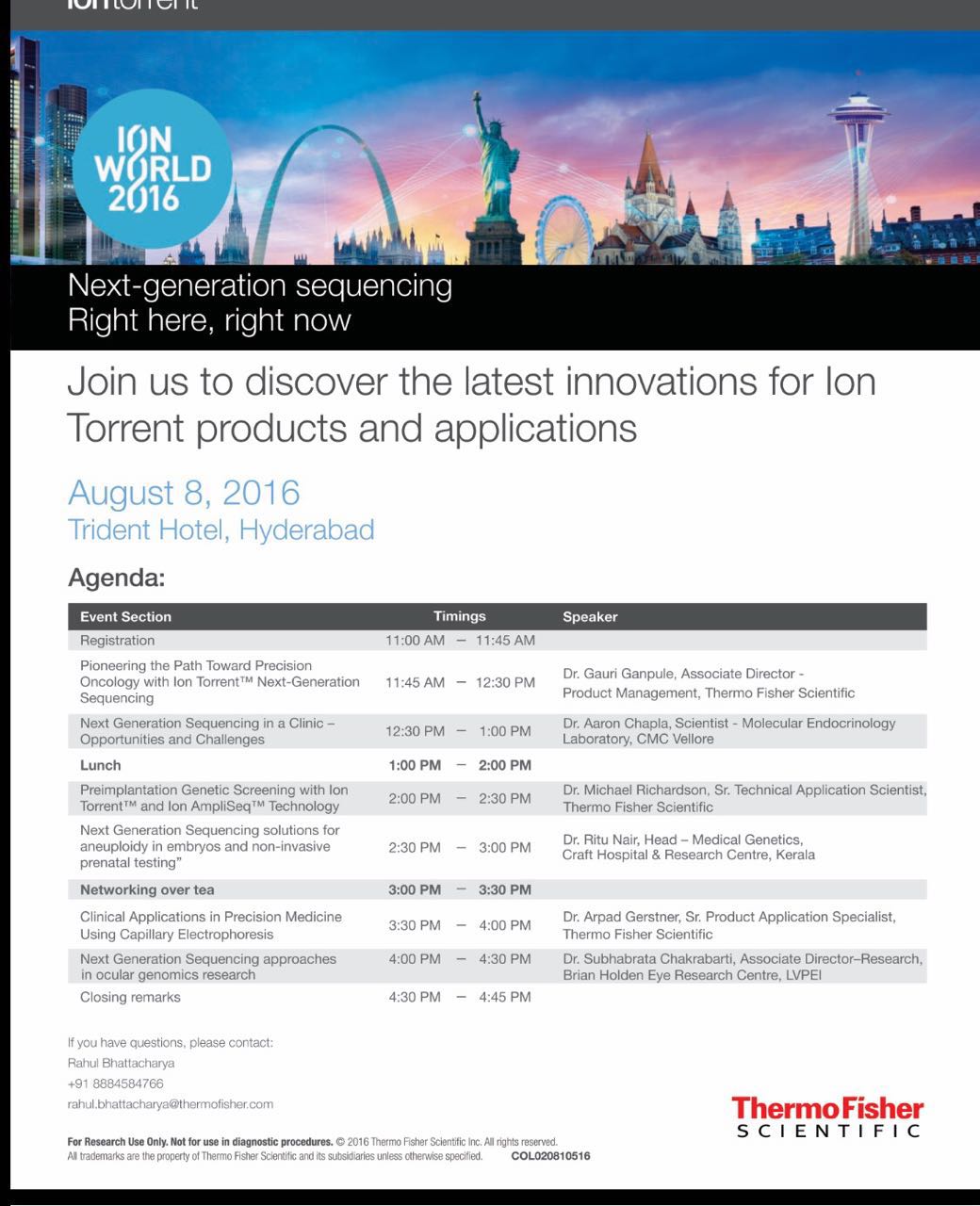
Dr. Ritu, Chief Geneticist, AR Genomics invited to deliver talk on NGS based PGS at Ion World 2016’ at Hyderabad.
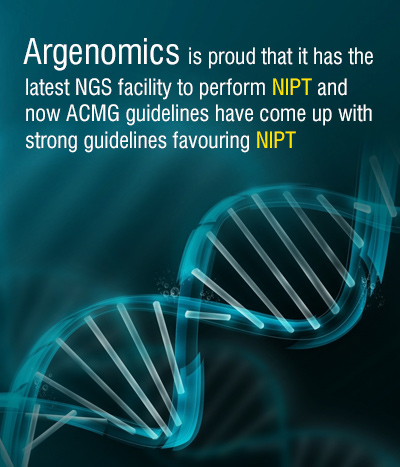
Noninvasive Prenatal Screening Can Replace Current Trisomy Screening in All Age Groups, ACMG Says Jul 28, 2016
NEW YORK (GenomeWeb) – Noninvasive prenatal screening from cell-free DNA is ready to replace conventional screening for trisomies 21, 18, and 13 in most women, and may have a role in screening for sex chromosome aneuploidy and selected copy number variants, according to a new position statement published today by the American College of Medical Genetics and Genomics.
The document, appearing in Genetics in Medicine, replaces ACMG's original 2013 policy statement on noninvasive prenatal screening (NIPS). In that publication, ACMG had stated that NIPS for fetal aneuploidy "has arrived" but that "there is room for refinement." The new statement, published by the ACMG Noninvasive Prenatal Screening Work Group, makes a number of key recommendations on the clinical use of NIPS, also known as NIPT, both for healthcare providers and testing laboratories.
Specifically, the document discusses patient education on prenatal screening and diagnostic options; use of NIPS in different pregnancy risk groups and reporting by laboratories; use of NIPS for conditions other than the three most common aneuploidies, including sex chromosomal disorders and copy number variations; how to avoid and manage no-calls; and special conditions, such as twin pregnancies and incidental findings. In addition, it lists a number of third-party resources for patient and healthcare provider education on genetic conditions and related topics.
"Clinical validation strongly suggested that NIPS can replace conventional screening for Patau, Edwards, and Down syndromes," wrote the authors, led by Anthony Gregg at the Department of Obstetrics and Gynecology at the University of Florida, adding that "objective measures of clinical utility support this." In particular, NIPS can be applied across the maternal age spectrum and throughout pregnancy, beginning at 9 to 10 weeks of gestation, as long as the patient is not significantly obese, they wrote.
However, healthcare providers need to have "a thorough understanding of patient preferences," and be able to educate patients about the limitations of available tests.
In addition, they noted that "although clinical utility studies are limited, they point to a role for NIPS in sex chromosome aneupoloidy screening and screening for selected CNVs," in particular when the live birth frequency of those conditions is equal to that of currently screened disorders, and when the test metrics reach those of well-established prenatal screening approaches.
Specifically, ACMG recommends that patients should be informed early in pregnancy about different testing options, including diagnostic and screening approaches.
Pregnant women need to know that NIPS is the most sensitive screening option for the three traditionally screened trisomies. If they obtain a positive NIPS result, they should be referred to a genetic professional and be offered diagnostic testing.
Testing laboratories should clearly state the detection rate, specificity, positive predictive value, and negative predictive value for all conditions screened, both in their marketing materials and on their report, and patients with positive results should obtain a patient-specific PPV. In addition, the report should contain the fetal DNA fraction, which determines whether the results are reliable.
In cases of a no-call due to low fetal fraction, where the test did not yield a result, ACMG recommends diagnostic testing rather than a second NIPS test. Significantly obese women, who often have a low fetal DNA fraction, should be offered non-NIPT aneuploidy screening right away.
ACMG further recommends that all pregnant women be informed about the availability of NIPS for sex chromosome aneuplodies and for clinically relevant CNVs, though providers should deter patients from selecting the former for the sole purpose of fetal sex determination.
The College does not recommend the use of NIPS for rare chromosomal aneuplodies and for genome-wide CNV screening – for the latter, it recommends diagnostic testing.
In twin or other multiple pregnancies, or when donor oocytes were used, ACMG recommends contacting the testing laboratory regarding the validity of their NIPS for those conditions.
Patients should also be informed about the possibility of incidental findings, such as maternal genomic imbalances.
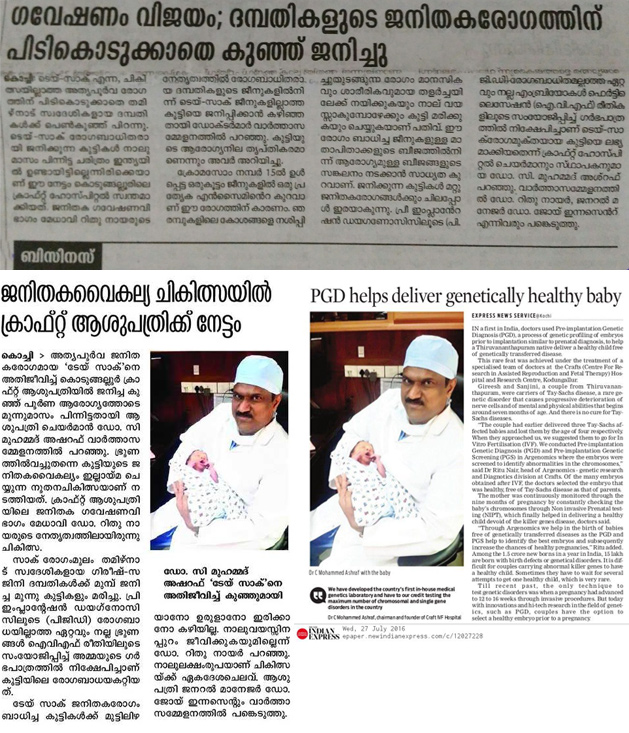
PGD helps deliver genetically healthy baby at CRAFT Hospital.
By Express News Service Published: 27th July 2016 05:53 AM KOCHI: IN a first in India, doctors used Pre-implantation Genetic Diagnosis (PGD), a process of genetic profiling of embryos prior to implantation similar to prenatal diagnosis, to help a Thiruvananthapuram native deliver a healthy child free of genetically transferred disease. This rare feat was achieved under the treatment of a specialised team of doctors at the Crafts (Centre For Research in Assisted Reproduction and Fetal Therapy) Hospital and Research Centre, Kodungallur. Gireesh and Sanjini, a couple from Thiruvananthapuram, were carriers of Tay-Sachs disease, a rare genetic disorder that causes progressive deterioration of nerve cells and of mental and physical abilities that begins around seven months of age. And there is no cure for Tay-Sachs diseases. “The couple had earlier delivered three Tay-Sachs affected babies and lost them by the age of four respectively. When they approached us, we suggested them to go for In Vitro Fertilisation (IVF). We conducted Pre-implantation Genetic Diagnosis (PGD) and Pre-implantation Genetic Screening (PGS) in Argenomics where the embryos were screened to identify abnormalities in the chromosomes,” said Dr Ritu Nair, head of Argenomics - genetic research and Diagnotics division at Crafts. Of the many embryos obtained after IVF, the doctors selected the embryo that was healthy, free of Tay-Sachs disease as that of parents. The mother was continuously monitored through the nine months of pregnancy by constantly checking the baby’s chromosomes through Non invasive Prenatal testing (NIPT), which finally helped in delivering a healthy child devoid of the killer genes disease, doctors said. “Through Argenomics we help in the birth of babies free of genetically transferred diseases as the PGD and PGS help to identify the best embryos and subsequently increase the chances of healthy pregnancies,” Ritu added. Among the 1.5 crore new borns in a year in India, 15 lakh are born with birth defects or genetical disorders. It is difficult for couples carrying abnormal killer genes to have a healthy child. Sometimes they have to wait for several attempts to get one healthy child, which is very rare. Till recent past, the only technique to test genetic disorders was when a pregnancy had advanced to 12 to 16 weeks through invasive procedures. But today with innovations and hi-tech research in the field of genetics, such as PGD, couples have the option to select a healthy embryo prior to a pregnancy.

One of the major reasons for the recurring pregnancy losses and IVF failures is a disorder occurring in the endometrium which mainly concerns abnormal gene expressions. Now using the procedure Endometrial Receptor Gene Assay (ERGA), it is possible to...

This is the prenatal genetic testing of foetal chromosomal aneuploidies from Mother’s Blood. We have the credit of being the first centre in the Indian subcontinent to develop in-house Non-Invasive Prenatal Testing (NIPT) which is 99.9% sensiti...










